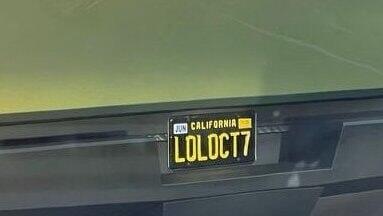Getting your Trinity Audio player ready...
The California Department of Motor Vehicles (DMV) apologized this week for issuing a personalized license plate that some interpreted as mocking victims of the October 7 Hamas attack.
The DMV revoked the plate, citing its policy against hateful messages, despite the vehicle owner’s claim that the controversy stemmed from a misunderstanding.
The plate, which read “LOLOCT7,” gained attention after the advocacy group StopAntisemitism shared a photo of a Tesla Cybertruck with the plate at a Culver City intersection near Los Angeles. Critics argued the combination of characters could be read as celebrating the attack, with “LOL” (laugh out loud) and “OCT7” referencing the date of the Hamas assault.
StopAntisemitism called on the DMV to cancel the plate, accusing it of “celebrating the October 7th terrorist attack” and calling it a “vile mockery.” The DMV responded by issuing a formal apology and announcing the plate’s revocation.
Get the Ynetnews app on your smartphone: Google Play: https://bit.ly/4eJ37pE | Apple App Store: https://bit.ly/3ZL7iNv
“We sincerely apologize that these personalized plates were not properly rejected during the review process,” the DMV said in a statement. “The use of hateful language violates is not only a clear violation of our policies but also a violation of our core values to proudly serve the public and ensure safe and welcoming roadways.”
However, the vehicle owner’s son, a Filipino-American who requested anonymity, said the plate’s meaning had been misunderstood. He explained that “LOLO” means “grandfather” in Tagalog, the national language of the Philippines, while “CT” refers to the Cybertruck model, and the number 7 represents the owner’s seven grandchildren. He added that this explanation had been provided to the DMV before the plate’s approval.
2 View gallery


Palestinian bulldozer crashes through border fence with Israel during October 7 attack
"We have great empathy for anyone who has experienced any hatred," the son told ABC7. "And we would really appreciate, in turn, for anyone that's seeing this or hearing this to have any empathy toward our family because we had no ill intent for anything."
California allows drivers to request personalized license plates combining letters and numbers with symbolic meaning. However, like most U.S. states, it imposes restrictions on messages deemed racist, political, religious or vulgar.
The incident highlights broader debates over personalized license plates. In Maine, a decade-old law barring state officials from rejecting offensive plates was repealed after plates with vulgar terms such as profanity and explicit sexual references became common. The state has since reinstated restrictions to curb the trend.


